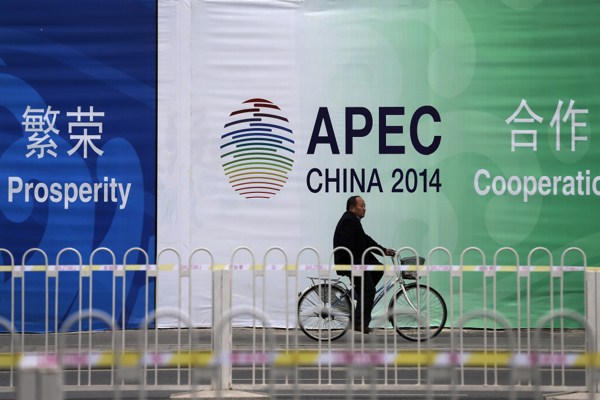Next week, China will host 20 heads of state at the Asia Pacific Economic Cooperation (APEC) leaders’ meeting in Beijing, the biggest international event held in China since President Xi Jinping took power in 2012. In addition to advancing some of APEC’s standard agenda items from previous years, China is expected to use the summit as a platform to push for several regional integration initiatives of its own. While these proposals do have economic benefits for other Asian nations, their progress may be undermined by differences among APEC members, principally the United States and China, over how to promote trade and investment in the region.
APEC was founded in 1989 to promote free and open trade and investment in the Asia-Pacific, and today its 21 member economies represent half of global trade and 60 percent of world GDP. This year is an important one symbolically for APEC, as 2014 is both the 25th anniversary of its founding as well as the 20th anniversary of the adoption of its so-called Bogor Goals, which set a target of free and open trade and investment by 2020. It has also been a challenging year thus far for the world economy, with an anemic global recovery, continued turmoil in Europe and a host of geopolitical crises ranging from the Ebola epidemic to the rise of the so-called Islamic State in the Middle East. Some good news from the APEC leaders’ meeting next week in Beijing would be more than welcome.
Little surprise, then, that Beijing has pulled out all the stops to make the meeting and China’s year as APEC’s host country a success. To temporarily ease travel and reduce pollution in Beijing for the summit, the government has diverted traffic, ordered schools and government offices to take an “APEC holiday” and shut down factories. Substantively, Beijing made early progress on the three priorities it outlined for its host year: advancing economic integration; promoting innovative development, reform and growth; and strengthening connectivity and infrastructure development. Two of the big-ticket items likely to be discussed at the summit next week will be laying the foundation for the so-called Free Trade Area of the Asia-Pacific (FTAAP) and formulating a blueprint for infrastructure investment and development, including Beijing’s new Asia Infrastructure Investment Bank (AIIB).

